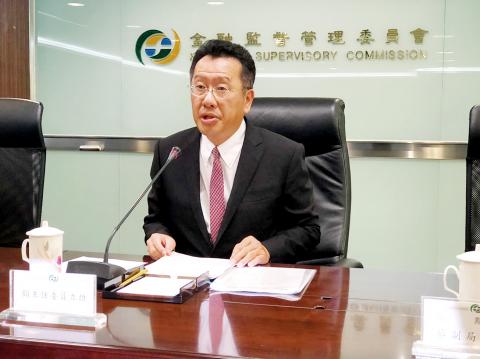Financial Supervisory Commission (FSC) Chairman Wellington Koo (顧立雄) yesterday announced that three Web-only bank licenses would be granted to teams led by Chunghwa Telecom Co (中華電信), Line Financial Taiwan Corp (台灣連線金融科技) and Rakuten Inc.
The announcement surprised many, as the regulator had originally planned to only approve two licenses.
“We intended to select the best two teams, but during the review process we found that it was difficult to deny any of the three competing teams, as they all have their own advantages, operating models and target clients,” Koo said.

Photo: Kao Shih-ching, Taipei Times
Line Bank (連線商業銀行), Line Financial’s planned virtual bank, would focus on Line’s own user base, while Next Bank (將來銀行), led by Chunghwa Telecom, would concentrate on the telecom’s customers who are favored less by traditional banks and small companies, Koo said.
The third bank planned by Japan-based Rakuten Inc and its partner, IBF Financial Holdings Co Ltd (國票金控), would target people aged 35 to 55, Rakuten’s own customers and those who rely on smartphones or are interested in “Japanese-style financing,” he added.
The three teams would bring distinct innovations to the banking industry, with Line offering prescheduled transfers, Next Bank providing services driven by artificial intelligence to remind clients of payments, and Rakuten enabling its clients to open a dual-currency account and easily withdraw yen using a Taiwanese card, Koo said.
The nine-person review panel determined that all three teams would offer more convenience to consumers, satisfy unmet needs and improve financial technology, Koo said.
“The three teams’ scores were pretty similar and were favored by different panel members, which was one of the reasons we thought we should issue three licenses,” he said.
The three virtual banks are expected to begin operations in eight to 20 months, and to turn a profit in three years to five years, Koo said.
The commission would ban the virtual banks from setting unreasonably low fees, which would disrupt the market order, he said.
The commission said that it had planned to issue only two licenses to reduce competition in the already crowded market, but believes there is room for one more virtual bank in Taiwan after Australia and New Zealand Banking Group Ltd (ANZ) in April consolidated its local operations after completing the sale of its retail business to DBS Bank Ltd in 2017.
The number of banks in Taiwan had fallen from 39 in 2015 to 37 in 2016 and further to 36 this year after ANZ’s move, Koo said, adding that the number would recover to 39 after the three virtual banks start operations.
Considering that other nations have been granting more licenses to Web-only banks, which have a smaller market share, it should be acceptable to approve three licenses, he said.
Web-only banks do not have conventional branches. While Taiwan does not yet have any, they are available in Japan, South Korea, Hong Kong and Singapore.

CHAOS: Iranians took to the streets playing celebratory music after reports of Khamenei’s death on Saturday, while mourners also gathered in Tehran yesterday Iranian Supreme Leader Ayatollah Ali Khamenei was killed in a major attack on Iran launched by Israel and the US, throwing the future of the Islamic republic into doubt and raising the risk of regional instability. Iranian state television and the state-run IRNA news agency announced the 86-year-old’s death early yesterday. US President Donald Trump said it gave Iranians their “greatest chance” to “take back” their country. The announcements came after a joint US and Israeli aerial bombardment that targeted Iranian military and governmental sites. Trump said the “heavy and pinpoint bombing” would continue through the week or as long

TRUST: The KMT said it respected the US’ timing and considerations, and hoped it would continue to honor its commitments to helping Taiwan bolster its defenses and deterrence US President Donald Trump is delaying a multibillion-dollar arms sale to Taiwan to ensure his visit to Beijing is successful, a New York Times report said. The weapons sales package has stalled in the US Department of State, the report said, citing US officials it did not identify. The White House has told agencies not to push forward ahead of Trump’s meeting with Chinese President Xi Jinping (習近平), it said. The two last month held a phone call to discuss trade and geopolitical flashpoints ahead of the summit. Xi raised the Taiwan issue and urged the US to handle arms sales to

State-run CPC Corp, Taiwan (CPC, 台灣中油) yesterday said that it had confirmed on Saturday night with its liquefied natural gas (LNG) and crude oil suppliers that shipments are proceeding as scheduled and that domestic supplies remain unaffected. The CPC yesterday announced the gasoline and diesel prices will rise by NT$0.2 and NT$0.4 per liter, respectively, starting Monday, citing Middle East tensions and blizzards in the eastern United States. CPC also iterated it has been reducing the proportion of crude oil imports from the Middle East and diversifying its supply sources in the past few years in response to geopolitical risks, expanding

Pro-democracy media tycoon Jimmy Lai’s (黎智英) fraud conviction and prison sentence were yesterday overturned by a Hong Kong court, in a surprise legal decision that comes soon after Lai was jailed for 20 years on a separate national security charge. Judges Jeremy Poon (潘兆初), Anthea Pang (彭寶琴) and Derek Pang (彭偉昌) said in the judgement that they allowed the appeal from Lai, and another defendant in the case, to proceed, as a lower court judge had “erred.” “The Court of Appeal gave them leave to appeal against their conviction, allowed their appeals, quashed the convictions and set aside the sentences,” the judges